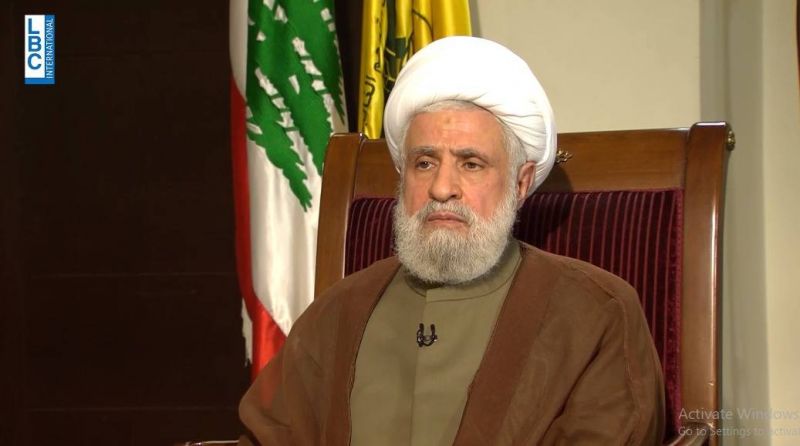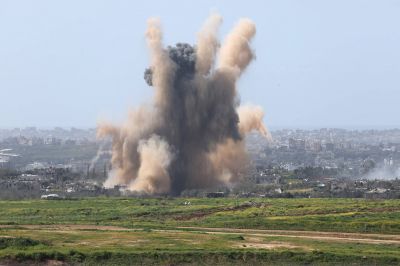
Hezbollah deputy leader Sheikh Naim Kassem in an interview with LBCI on March 6 2024. (Screenshot from LCBI)
BEIRUT — Hezbollah's Deputy Secretary-General, Sheikh Naim Kassem, said there's a "90 percent chance" that the cross-border fighting with Israel will not evolve into a large-scale war in the country, but that Hezbollah is "ready for the 10 remaining percent," during an interview with LBCI on Tuesday night.
In the interview on "Kalam Bel Siyasa" ("Political talks"), Kassem claimed that Israel's perception of Hezbollah's readiness influences their hesitation to escalate, adding, "we haven't dragged Lebanon into conflict; a significant Israeli threat exists." He clarified, "an undeterred enemy poses a constant threat of war."
"We are not closer to a total war in Lebanon," Kassem said. "There's a 90 percent chance that there won't be a larger-scale war" in the country.
Up until this point, Hezbollah is in a "defense position," Kassem explained, claiming the party does not want to "drag Lebanon into a war, but there's a dangerous enemy that could a start a war at anytime against our country, without any justifications."
This is why, according to him, "early deterrence is crucial to safeguard Lebanon ... Israeli restraint benefits all Lebanese."
He also added that the Iranian Revolution Guards Corp "is not present on the Lebanese field."
Regarding a potential cease-fire between Hamas and Israel, Kassem said that “no commitments or agreements are in place."
Earlier this week, US Special Envoy Amos Hochstein told Lebanese officials that a truce in Gaza would not automatically apply between Israel and Hezbollah.
Contrary to the American diplomat's statement, Kassem declared that "if there's a truce in Gaza, there will be a truce here" in southern Lebanon, but "if a ceasefire emerges in Gaza and Israel rejects peace in southern Lebanon, Hezbollah will resist, concluding that Israel "cannot impose its terms on us; they will face defeat."
Hezbollah and Israel have exchanged daily fire since Oct. 8, when Hezbollah opened a front in southern Lebanon "in support of the Palestinian resistance in Gaza," Kassem reiterated.
Mediators are currently in Cairo to try to broker a cease-fire between Hamas and Israel.
The Cairo talks have been billed as a final hurdle to reach an extended cease-fire in the war between Hamas and Israel — a 40-day truce during which Israeli hostages would be freed and aid pumped into Gaza — ahead of Ramadan, which is due to begin early next week.
'Others must adapt'
Regarding the political crisis, Kassem reiterated Hezbollah's support of Sleiman Frangieh as their primary presidential candidate. "At present, we are not considering another candidate. Others must adapt, not us."
Regarding the latest presidential initiative, Kassem confirmed, "we have yet to provide a definitive response to the National Moderation Bloc," which consists of six MPs who are mainly former Hariri supporters, and is attempting to launch an initiative to end the prolonged presidential vacancy. The seat has been empty since Michel Aoun left the Baabda Palace in October 2022.
The initiative aims to encourage all blocs to convene in Parliament and demand an open session for the election of a President.
Kassem pointed out that Frangieh represents the "political ethos of the 'Axis of Resistance'," with which, as an ally to Hezbollah, the Free Patriotic Movement (FPM) is aligned. He highlighted Frangieh's reconciliations, engagements with Arab nations, communications with the Americans, and openness to dialogue with all parties.
Addressing the presidential deadlock, Kassem characterized the conflict has primarily internal, emphasizing the unwillingness of parties to compromise.
He pushed back on the pressure for Hezbollah to adjust its position, saying "Why should we be the ones to compromise? They cannot assign blame to us; we do not impose our will on anyone, nor should anyone impose theirs on us."
The Parliament has so far held 12 fruitless sessions in an attempt to elect a president.
Hezbollah's support of Frangieh has strained its relationship with the FPM as its leader, Gebran Bassil, who is also a presidential hopeful, is Frangieh's main political rival.
Kassem underlined Hezbollah's right to disagreement, asserting that the constitution ensures sectarian balance and their allies' right to obstruct the quorum in successive sessions.
On the relationship with FPM, Kassem mentioned differences in beliefs and visions but that “communication remains open.”
